EUROPE - "Originality is important" - "Walk the Earth" Interview with JOHN NORUM
- Details
- Category: Interviews
- Published on Saturday, 06 January 2018 10:56
- Written by Richman

Born in Norway in 1964, John Norum is a founding member of the Swedish Hard Rock band EUROPE. Considered as one of the best Hard Rock guitarists of our time, John has put his stamp on countless landmark albums, including several solo records. We caught up with the artist in Vienna during EUROPE’s show with ALICE COOPER in November last year to talk about EUROPE’s eleventh full-length studio album “Walk the Earth”.
“Walk the Earth” marks another step in the band’s evolution as one of the continent’s most eminent Rock bands. In November 2017, the band played one of their highly anticipated shows in Vienna, Austria. We talked with John about recording “Walk the Earth” at the Abbey Road Studios in London, his influences, gear and advice on how to become a better musician.
Welcome to to Vienna John! It's a pleasure having you in the Austrian capital.
Thank you.
I understand that this is the only show with ALICE COOPER on the tour, is that correct?
Yes, I think so.
When you grew up, was ALICE COOPER among the records that you were listening to?
Yes.
Did you have records of him?
Yes, yes, I did. I love “Billion Dollar Babies” (1973), which was great, but my favourite one was “Muscle of Love” (1973). And that's also my favourite ALICE COOPER song.
You've just released a new album by the title of “Walk the Earth”. Working out your solo parts on the new record, how did you go about that? Is that something that comes spontaneously or do you invest a lot of time into preparing and composing your solos?
I wish I had the time to do it. I can do that when I do my solo stuff, you know. I take whatever time I need to finish it. I don't have deadlines. I hate deadlines. It has nothing to do with art whatsoever. When an album is done and everybody is happy with it, then you should release it. You shouldn’t put a date on it, I think. I don’t think you should go on and say, well, this album has to be done in two weeks or three weeks and then that's it, it's over with. I don’t do that with my own stuff. You know, Rome wasn’t built in a day. Leonardo da Vinci didn’t have a deadline when he painted Mona Lisa. He showed it the world when he was ready. He didn’t have someone telling him, you have to be ready at this day of month, year, day or whatever. So I don’t do that type of thing. So a lot of stuff gets rushed.

When we went into studio now, I pretty much didn’t have anything done or ready beforehand. Maybe for one or two solos I had slight ideas, but it was just going to the studio and try to do something right on the spot, do it fast. I’d do four or five different versions. When I've done a couple of solos, I'd bring the guys in, and ask them what they thought of what I have played. Either they'd say, they love it, and that it's greatly done, or they'd say, well, you can change this bit and that bit, and I do it. That's how it works. It's very on the spot. And sometimes that's good, too.
You appear to have a very straightforward approach to recording stuff. How important was going into the Abbey Road Studios in London, with all the special equipment that's there?
It was exciting. I mean, legendary artists have been there, and recorded there. Everyone knows about THE BEATLES and PINK FLOYD - you name it.
Could you sense the atmosphere?
Definitely. It's exciting. Standing next to the console and mixing desk of where DAVID GILMOUR recorded all his guitar parts for “The Dark Side of the Moon”. So I'm standing right there and looking at us like, "Wow, this is amazing".
We used a lot of their gear. And also another console which looked very, very old. I think it was used by Ringo Starr as well. So we used used that for some of the drums, and we were using their vintage gear, such as old compressors and old echoes, reverbs etc..
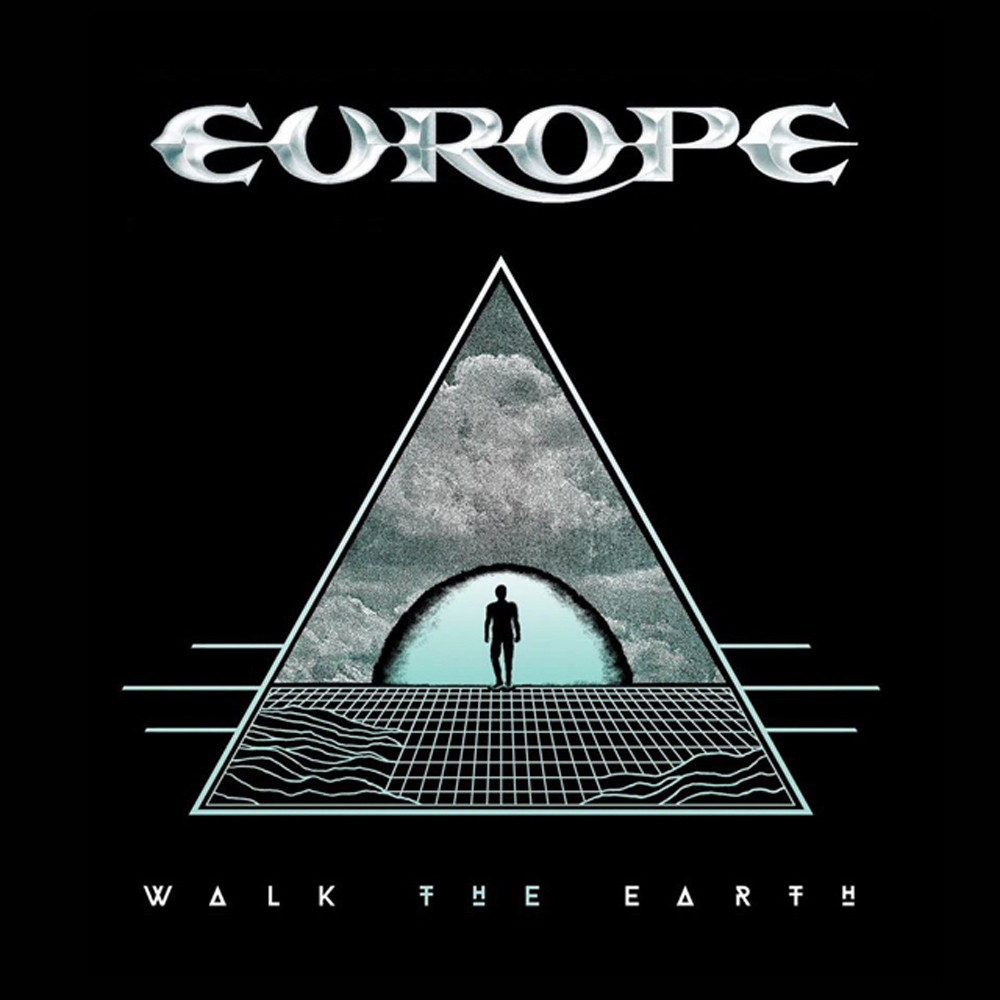
Did you bring your own equipment as well or was it just, we'll take what's there in the studio?
Yeah, we just used what they had there. Of course, I'd bring my own amps and guitars, but that's it. What they have there are is some amazing equipment. We like the sound of old gear, you know, because everything is going to be digital anyways. So we worked through Pro Tools. But if you mix that together with old vintage gear, you can actually make the digital recording very warm sounding. So it's a combination of old and new.
Are you very much into gear?
Yes, extremely, yeah.
How many guitars do you have?
Well, I'm not a collector. I don’t have a lot of guitars. I haven’t counted them for a long time. It’s not that many. It used to be more. But what I do is when I don’t use something, I get rid of it. I don’t see the point of them just sitting there and not being played. Guitars are supposed to be played. And I've sold a few that I regret selling too, you know. It's like “Oh, no, I shouldn’t have sold that guitar”. But maybe it's around 15 maybe, something like that. But I only used maybe five out of those. I mean, for the album I used five. But when I'm at home, I play them all, at some point anyway. But I think in the studio I only used five guitars, but mainly my Stratocaster for 80 percent of the album.
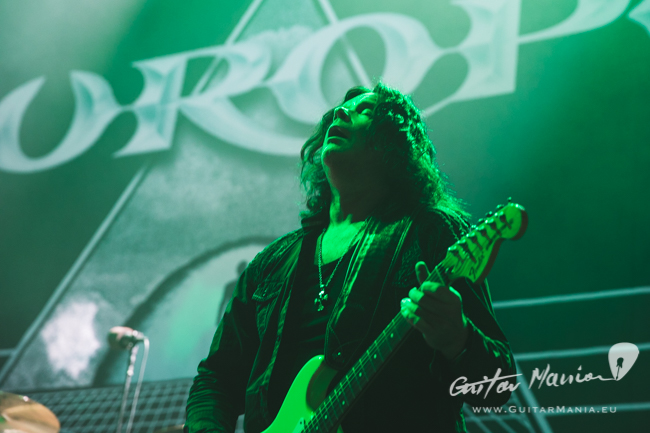
And are these guitars also the same guitars that you use for playing live?
Yes.
You're not worried that they might be stolen?
Well, except for one. You know, I used my old 1965 Stratocaster, which I call the “Final Countdown” guitar, because I used it on the “Final Countdown” album. I bought the guitar in 1984. So that's the only guitar that I have left from the 80s. It's a 1965 model. And I use that on quite a lot of solos on the new album. So I don’t bring that one on the road. I'll leave that one at home.
It's too precious, I assume …
Yeah, it is. The other ones are just newer ones, like a Gibson Les Paul 58 Reissue, a Flying V, which is a late 90s model, and a Strat that is from 2004, actually a Japanese model or built in Japan, which is really good. It's one of the best Strats I've ever played.
Do you believe in the theory that the more you play a guitar, the older it gets, the more the tone evolves, gets better like with vintage gear?
Definitely, yes. Definitely an older guitar has a warmer sound to it. The wood dries out and if it has been played a lot, you know, it resonates more. I'm not too crazy about new guitars. When I pick up new guitars, they are usually too bright. You need to play them for about a few years before they start sounding good. You can be lucky and find one, like the '58 Les Paul that I have. That one sounded old right from the get-go. It was very warm sounding.
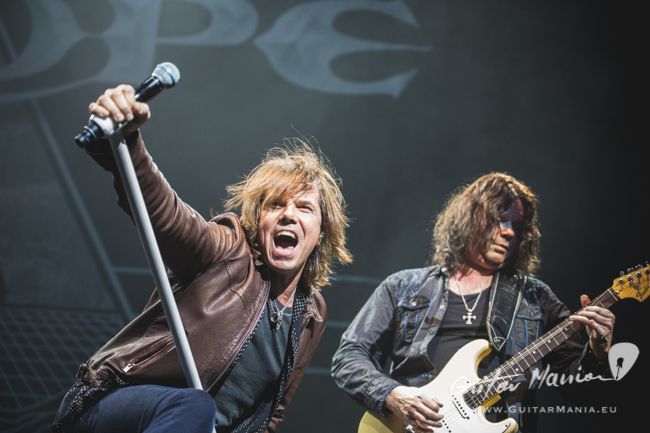
Out of the Les Paul custom shops, maybe you can find 1 out of 20 that sounds like an old one, which is warm and round, which I like. I don’t like treble guitars and stuff. I used to like lot of treble a long time ago, in the 80s like all kids do, you know, they just turn the treble up and, oh, this is perfect. But as you get older, the treble becomes almost like the enemy almost. It's like you don’t want to have that, you want a round fat sound. So I hear a lot of young players who always add way too much treble on everything. It's just piercing and it's annoying, really.
In terms of amps, are you a fan of modelling amps, for instance?
No, I'm very old school, you know (laughs). It's vintage stuff. Everything I use is old gear, except for the speakers, they're new. But I have old ones as well. I use old ones in the studio from old Celestion Marshall cabinets from the late 60s, early 70s. But at the moment, I'm using a new type of speaker live. They are in this great looking Jimi Hendrix reissue signature model cabinet which are a little bit taller than a regular Marshall cabinet. But I've changed the speakers to a type that's called V-types after seeing and hearing MICHAEL LANDAU - an amazing guitar player. He recommended to try the V-Type 70 watts. I watched an interview with him and he said, they are very thick and round on the high notes, that's exactly what I want. So that’s when I went for it. I mean, if he's using it, it has to be right. He knows what he's talking about.
He's fantastic …
Yes. He has such an amazing sound. And it's the same thing with ERIC JOHNSON, too. If he says a pedal is good, it is good. They have good ears and know what they're talking about.
In terms of playing, does John Norum still practice?
Yes, sometimes (laughs). When I don’t have to take care of the kids, which is pretty much every day, but yes I do, I do. Especially when on tour I practice quite a lot actually.
What do you practice?
I just play. I don’t have any special routine or anything like that.
I mean, you're such an accomplished musician and people just usually focus on the solo parts of your playing, but you're also a fantastic rhythm player.
Thank you.
And this is something that I think tends to be overlooked by young musicians maybe? Do you have any recommendations on how you can improve your rhythm playing?
Playing to a click is good. Buy a metronome and play rhythms to a metronome or step your feet. Step your feet like this (demonstrates making a rhythm with his foot), while you're playing and trying to get the rhythm going. A metronome is a good way to get it going. It might sound boring, but play along with albums and things like that. That's what I did, anyways.
Was there a particular album that was important for your development as a guitarist?
Yes, very much so. UFO’s “Strangers in the Night" with MICHAEL SCHENKER. He was and still is an amazing rhythm player. People overlook that a bit and they just say he's an amazing lead guitarist, which he is, of course, he's one of the best of all time, he's like one of my favourites. But his rhythms are incredible. I mean, he told me once, because we know each other a little bit. He played with us and stuff during Sweden Rock. He's on the Sweden Rock DVD, and we'd do a song together and stuff like that. And we've met several times and talked about this and that.
And he said to me, you see, I have like this built-in metronome in me. I don’t need a metronome, it's already built inside of me. And it made me think, “Wow, that's amazing”, because I was asking which tempo we were going to do “Lights Out” in. Do you do the fast version or a slower version? And he said, “I don't know, I think we're doing the “Strangers in the Night” version, because I have a built-in metronome, so I know when it's going to be the right tempo, or not", which was really cool.

And also other rhythm players that I like a lot in Rock are EDDIE VAN HALEN, of course, he's incredible. He has that feel. The groove is really well. And I think GEORGE LYNCH is a really good rhythm player, he has a really nice groove.
Just keep practicing, and practice playing rhythms. It's always a lot more fun doing it when you play with somebody. For instance, with a drummer, or the bass player. Sitting by yourself playing rhythms is not as much fun. I hardly do it all, to be quite honest with you. When I play rhythm, I play with a band or I jam with someone.
But when I just sit in the dressing room, I usually play 90 percent solos. I might go through some choruses for the rhythm just to try to remember how they go. Especially the new songs from the new album, because they're not stuck yet. I still have to think about what I'm doing. The rest of the stuff I don’t think about. It's like autopilot, it just goes by itself. You shouldn’t be thinking in Rock, it's wrong. You should just feel it, you shouldn’t have to think about what you are going to do next, what is the next quarter. And when you start thinking like that, usually that's when you do make mistakes.

Any plans for another Solo-project?
Yes, I'm working on a solo album right now as we speak.
Can you tell us a bit about that?
It’s kind of the same style, kind of like my last one “Play Yard Blues”, which came out a long time ago (released in May 2010). I don’t do a Solo album very often. Maybe every five or six years because I'm busy with Europe all the time and with the family and all that stuff. So it will be out sometime in February, or March. It will be a Blues/Hard Rock based thing, a little bit of Hendrix, Frank Marino, that type of thing. I mix all kinds of different stuff, there is even some Pop on there, too.
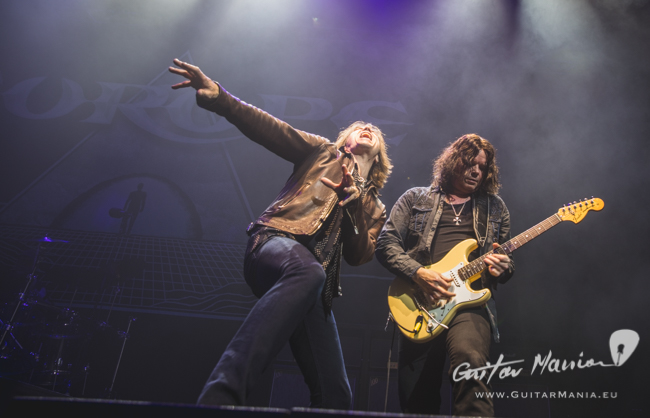
Really?
Oh, yes. And then you have some really heavy stuff as well, but in a kind of Blues & Hard Rock way manner. And then there will be an instrumental song, where I burn like crazy. We needed to have one of those in there, you know. And then I'm doing a DAVID BOWIE tribute song as well.
David Bowie?
Yeah.
Fantastic.
Yes. He was one of my big influences when I grew up in the 70s. So when he passed away, I thought, well, I've never done a Bowie song before. But I thought I want to put one cover on this album and it's going to be a DAVID BOWIE song, which is something completely different. So it's very versatile. You have a little bit Pop, you have some heavy Hard Rock and you have some Reggae as well, instrumental stuff, everything (laughs). That's what so fun about doing a Solo project because there is no one telling me what to do. I can do whatever I want.
Will you be touring with the new stuff?
Maybe, one should never say No, you never know. We will see what happens. I might do a few gigs. That would be fun actually. But at the moment I'm so busy with touring with EUROPE and the family. The family always comes first. So that takes a lot of time because they are so small, it takes a lot of time to …
You tell me …
Oh, yeah, yeah, yeah.
John, final question, any words of wisdom for young aspiring musicians that want to make a living out of being musicians?
Well, it was definitely easier when I grew up. Now there are like millions and millions of really, really great guitar players around. I mean, (just have a look at) YouTube, for example. They're all good players. Great players. So it's much more difficult now, than when I grew up because there weren’t that many. But I think you should just keep on practicing and try to develop your own style which I think is very important. I started out listening to MICHAEL SCHENKER, GARY MOORE, RITCHIE BLACKMORE, pretty much all the guitar players from the late 60s and 70s. I learned a lot from all of them. And then I just kind of mashed it all together and did this (mimics stirring a great pot). And that's where I came from. So it's a little mix of everybody.
What I try to do is to try to be different than others. I try to play as melodic as possible. But the band is a very melodic Hard Rock band, so melodies are very important for me anyways. Just keep on practicing. I was a fanatic in the beginning. I mean, I did six, seven, eight hours (of practice) a day. I'd just keep going and going and going because there was nothing else to do (laughs). Find something that you're interested in and do it.
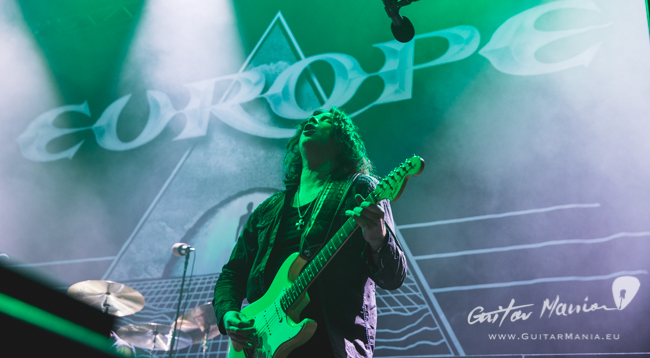
This was before the Internet, this was before video games, this was before all this stuff. So either you are in sports, or you play music, or whatever you were interested in, and you put all your energy into that.
I see a lot of kids these days, that just get stuck in front of their iPads, or doing Playstation all day long, and that's their interest. But if you're really into music, I think it's very important to develop your own style. I mean, you don’t have to do it straight away. You learn from other guitar players. It has to come from somewhere. But later on it's very important that you try to find your own identity, your own thing, otherwise you're just going to be sounding like everybody else. You're not going to be number one, you're going to be a copy of someone else who is better. So, originality is very important.
Thank you John. You have been very generous with your time.
Thank you.

Thanks go to Ute Kromrey www.promotör.de for making this possible.
For more information, please visit www.johnnorum.se and europetheband.com
Transcription by Herm.
All images by Richman.




